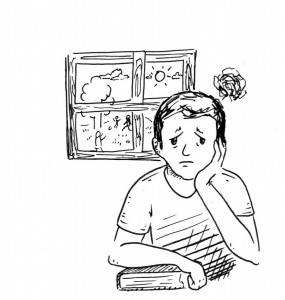In our society, the word “depression” gets thrown around without any regard to the debilitating effect it has on peoples’ lives.
While we are slowly accepting that depression is a clinically-proven illness, many continue to perpetuate the stigma attached to mental illnesses by prescribing to the notion that individuals with depression are weak-minded and unable to cope with life’s difficulties.
Such uneducated ideas lead to a far more difficult path for those facing an already daunting course.

David Delgado | The Daily Cougar
The Diagnostic and Statistical Manual of Mental Disorders defines clinical depression as meeting these symptoms for more than two weeks:
- depressed moods
- loss of interest or pleasure in most activities
- significant weight loss or gain
- sleeping too much or not being able to sleep at all
- slowed thinking or movement
- fatigue
- feelings of worthlessness or inappropriate guilt
- loss of concentration
- repeated suicidal thoughts
College presents a unique situation in that many students are away from their families, which is a first-time for many. This sense of unfamiliarity coupled with intense workloads, pressure to succeed and the desire to fit in has led many students to feel hopeless, alone or depressed.
While such feelings are perfectly normal, certain criteria tip the scale toward clinical depression.
A 2007 study conducted by the Department of Health Management and Policy at University of Michigan’s School of Public Health found that 15.6 percent of undergraduates had depression or anxiety disorder and about three in every 20 students may have faced or are facing some form of depression.
Often, when we know someone who has struggled emotionally for some time, we pitch the idea that positive thinking will lift them out of their depression. While providing comfort for loved ones is the right thing to do, a difference exists between clinical depression and the occasional blues. Sometimes our well-intended comfort can lead people to think that overcoming their depression is something they can do entirely on their own. However, it’s important to understand that clinical depression is a unique illness and requires professional attention and medication.
In addition to the startling rate of depression among college students, a 2008 study by the American Foundation for Suicide Prevention-sponsored College Screening Project at Emory University found that 11.1 percent of college students experienced suicidal ideation in the four weeks before the study and 16.5 percent of college students have attempted to seriously hurt themselves or commit suicide at some point in their lives. The same study at Emory found that 85 percent of students with depression are not being treated for their illness.
These shocking statistics scream the need for students to be better educated about the help and resources available to them.
Each student at the University is given free initial consultations at the Counseling and Psychological Services, which is located at Student Service Center Building 1. Follow-up meetings are $5. In addition to individual counseling, CAPS also provides free group counseling for students.
Any student who may be depressed or have suicidal thoughts shouldn’t let anything stop them from getting help.
Trisha Thacker is a biology junior and may be reached at opinion@thedailycougar.com.
